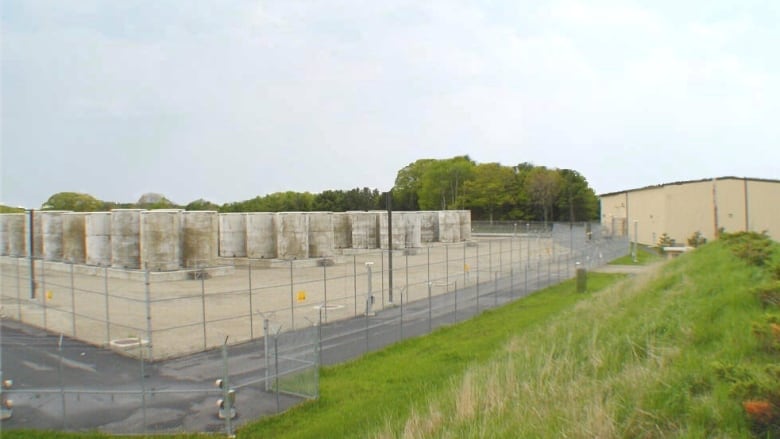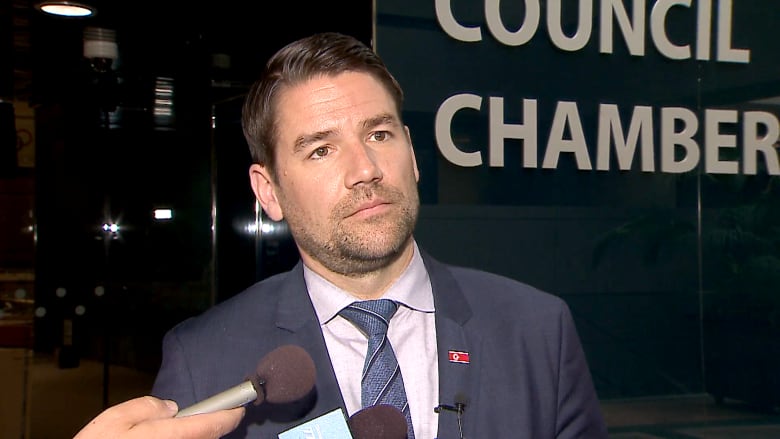Calgarians have a stake in Maine nuclear fuel storage facility
Facility part of the deal when Enmax bought U.S. utility for $1.8 billion, including debt

Enmax's acquisition of a utility in Maine last year came with a nuclear surprise that city council members say they weren't told about.
When the city-owned Enmax closed on its deal to buy Versant Power (formerly Emera Maine) in March of 2020, it also acquired Versant's interest in a former nuclear power plant.
The Maine Yankee plant operated from 1972 to 1996 and was decommissioned in 2005.
Versant owned 12 per cent of the electricity generated by the power plant. Its ratepayers also paid up front for 12 per cent of the decommissioning costs.
The plant was torn down and tonnes of spent nuclear fuel rods from the facility were temporarily encased in 64 concrete silos at a protected site in Wiscassett, Maine.
Part of the deal
The president of Versant Power, John Flynn, tells CBC News that Enmax couldn't avoid taking on the Maine Yankee obligation when it purchased Versant.
"As part of the acquisition, Enmax really didn't have the opportunity to pick and choose the assets or relationships or obligations it wanted," said Flynn. "It was making a bid for the entire company."
He said there isn't a market for a temporary nuclear waste storage facility, so any buyer of Versant would have had to take on that obligation.
There are approximately $10 million US in annual costs related to the safe operation of the spent nuclear fuel storage site, including monitoring, maintenance and security.
About 38 people work at the site.
But Flynn said this doesn't actually cost Versant or Enmax any money.
It's covered by a trust fund which includes legal settlements from the US Department of Energy (DOE), which has a legal responsibility to ultimately remove the tonnes of spent fuel and find a permanent storage site.
Temporary site may be used for years
Flynn said there's currently no estimate from the DOE on when it may move the materials to a final storage site.
He said the trust fund has enough money in it that the operation of the temporary facility will be covered for years to come.
In some years, Flynn said annual payments from the fund have been made to Versant customers who prepaid the decommissioning costs during the years the nuclear power plant was in operation.
The 11-acre temporary storage site is patrolled around the clock by armed security guards.
"The entire site is surrounded by a security perimeter that has 24/7 security that is of the level you would expect to see on an army base, so it is a hyper-secure site."
While Enmax says it doesn't own the spent nuclear fuel, it does list in its annual financial report the historical 12 per cent interest in Maine Yankee.
Council kept in dark
The situation concerns Coun. Evan Woolley, who said that Enmax never mentioned the spent nuclear fuel site when the utility briefed city council on its bid for Versant.
He is one of several council members contacted by CBC News who said they were unaware of that part of the $1.3 billion acquisition, which also included $500 million in debt.
"Owning 12 per cent of a company that owns a bunch of nuclear waste has not only reputational risk but also real risk in terms of the world that we live in," said Woolley.

The Ward 8 councillor, who is also the chair of council's audit committee, said he would have liked to have known this information before council approved Enmax's purchase.
"For us to not have been made aware of that is unacceptable," said Woolley.
"Enmax and now Versant Power, which was Emera Maine, is owned by Calgarians. So council and the shareholder are accountable for that decision."
Outside eyes needed
He describes Enmax's pitch to city council to approve its takeover of the company in Maine as "rushed."
His preference is that in future, a third party could assess such business opportunities for council and make a recommendation.
That perspective could come from the city's chief financial officer, the city solicitor or an external consultant.
A report is expected before the audit committee in September, which he said could result in changes that could help ensure Enmax and all of the city's wholly-owned subsidiaries are on the same page as city council in the future.
He describes Enmax as "the massive gorilla in the room in terms of its size and scale."
"The risk appetite of Enmax versus the risk appetite of a shareholder are different. And that's where we need to provide better alignment," said Woolley.
If council approves of any changes for its subsidiaries, he said it would mean that another transaction like the Versant purchase could not occur in the way that it did.
No comments:
Post a Comment